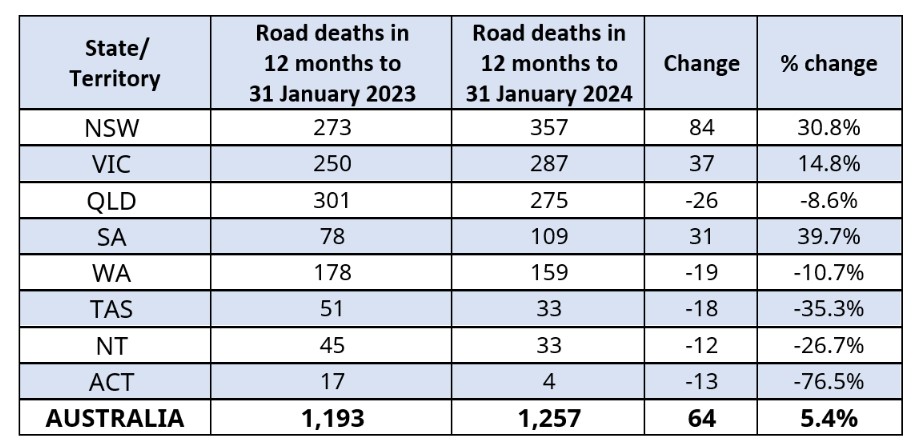
New figures show Australia’s road toll continues to climb, with 1,257 deaths on the roads in the year to January 31 – up 5.4 per cent on the same period a year ago.
The nation’s peak motoring body says the figures, which include a 30.8 per cent surge in road deaths in NSW and a 39.7 per cent increase in South Australia, demand action to end government secrecy over data that could explain what is going wrong on the nation’s roads.
January’s increases follow a major surge in road deaths in the second half of 2023, which saw 683 road deaths recorded – the deadliest consecutive quarters on Australian roads since the first half of 2010.

AAA Managing Director Michael Bradley said: “Data needed to understand the causes of our increasing death toll is collected by state and territory governments, but it is not being reported, or shared.
“This critical information describes the quality of Australian roads, the causes of crashes, and the effectiveness of each state’s road rules and enforcement regime.
“Without this data Australia has no credible plan to understand its current road trauma problems or prevent their continuation.
“Data sharing will save lives, as it will reveal which state’s road safety measures are the most effective, and the safety interventions that are most needed.
“And it will also end the politicisation of road funding, as it will reveal whether governments are investing in the roads that most need safety upgrades.”
The AAA and 18 other national bodies continue to call upon the Federal Government to compel states to publish this data via the new National Partnership Agreement on Land Transport Infrastructure Projects which is currently being negotiated with the states and territories. This agreement will dictate how $50 billion in federal road funding is allocated over the five years beyond July 2024.
The Data Saves Lives campaign calls on the Commonwealth to use the new Agreement to compel states and territories – as a condition of receiving federal road grants – to report existing road safety data.
AAA research shows Australians are deeply cynical about how politicians prioritise road project funding. It also shows that data transparency enjoys overwhelming community support.
Mr Bradley said: “Our polling shows Australians think this a commonsense approach that would not only save lives but also enhance accountability by reducing potential for pork-barrelling.
“Publishing road safety data will allow Australians to see whether politicians spend their money on roads to save lives or to win votes in marginal electorates.”
To its credit, the federal Labor Party committed in the week before the 2022 election to: “improve the timeliness and quality of road trauma data and look for opportunities to extract better quality road safety data from states and territories in return for funding of road projects”.
Data Saves Lives is supported by the nation’s motoring clubs, and 18 national organisations representing motorists, motorcyclists, truckers, pedestrians, doctors, insurers, road engineers and safety advocates.
The AAA’s proposal has been endorsed by all Liberal, National, Greens and Teals MPs in the House of Representatives.
But with only one exception, Labor MPs have so far declined to support road safety data transparency.
All Australian governments agreed to The National Road Safety Strategy 2021-30 in 2021. It aims to halve Australian road deaths through the decade to 2030.








